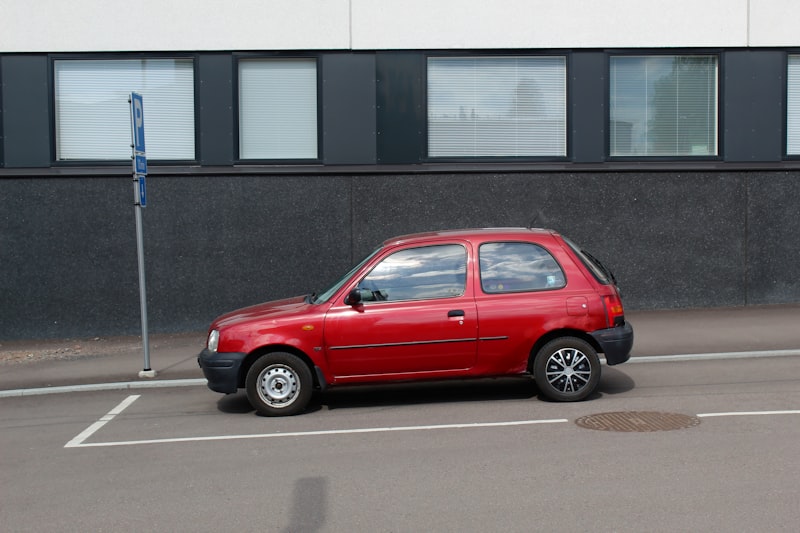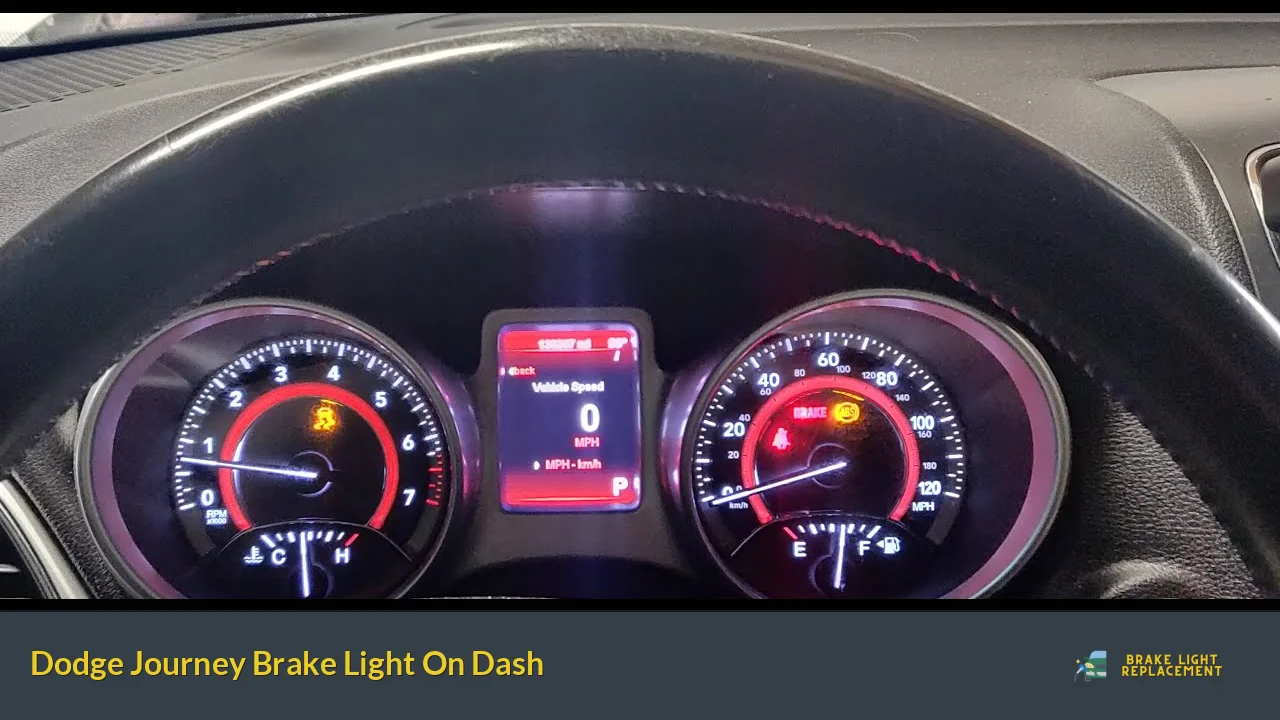
Are you tired of seeing that pesky brake light on the dash of your Dodge Journey? Don’t worry, you’re not alone. Many Dodge Journey owners have faced this issue, and it can be quite frustrating. In this article, we will explore the possible reasons behind the illuminated brake light and discuss what you can do to resolve the problem.
One common cause for the brake light being on is a low brake fluid level. The brake system in your Dodge Journey relies on an adequate amount of fluid to function properly. If the fluid level is low, it could indicate a leak in the system or worn-out brake pads. Checking the brake fluid reservoir under the hood and topping it up if necessary may resolve the issue. However, it’s important to address any underlying problems that led to the low fluid level.

Another possible reason for the brake light staying on is a faulty brake light switch. The brake light switch is responsible for activating the brake lights when you press the pedal. If the switch malfunctions, it can cause the brake light on the dash to illuminate even when the brakes are not engaged. Replacing the brake light switch should solve the problem in this case.
Additionally, a worn-out brake pad sensor could be triggering the brake light. Modern vehicles are equipped with sensors that monitor the thickness of the brake pads. When the pads become too thin, the sensor sends a signal to the dashboard, indicating the need for replacement. Inspecting the brake pads and replacing them if necessary should fix the issue.
In some cases, the brake light may persist even after addressing these common causes. This could indicate a more complex problem, such as an issue with the ABS (Anti-lock Braking System) or a malfunctioning electronic component. It is advisable to have a professional mechanic diagnose the problem accurately and carry out the required repairs.
To conclude, an illuminated brake light on the dash of your Dodge Journey can be caused by various factors such as low brake fluid, a faulty brake light switch, or worn-out brake pads. By checking the fluid level, replacing the brake light switch, and inspecting the brake pads, you can often resolve the issue yourself. However, if the problem persists, seeking professional assistance is recommended to ensure your safety on the road.
Troubleshooting Tips: Demystifying the Dodge Journey Brake Light on Dash
Are you familiar with the Dodge Journey brake light on the dash? It’s that pesky little indicator that can sometimes cause confusion and concern for drivers. But fear not, because in this article, we’re going to demystify this brake light and provide you with some valuable troubleshooting tips.
So, what does it mean when the brake light on your Dodge Journey’s dashboard illuminates? Well, typically, it indicates an issue with your braking system. It could be something as simple as your parking brake being engaged or as complex as a malfunction in the anti-lock braking system (ABS). Whatever the case may be, it’s essential to address the problem promptly to ensure your safety on the road.
One possible reason for the brake light coming on is low brake fluid levels. Your vehicle’s braking system relies on hydraulic pressure to function correctly, and if the fluid level drops too low, it can trigger the brake light. Check your brake fluid reservoir under the hood and top it up if necessary. Be sure to use the recommended type of brake fluid specified in your owner’s manual.
Another common culprit behind the brake light issue is worn brake pads. Over time, the brake pads wear down, resulting in reduced braking performance. When the pads become too thin, a sensor built into the brake pad will activate the brake light on your dash. If you notice any squealing or grinding noises while braking, it’s a good indication that your brake pads need replacement.
Furthermore, a faulty ABS sensor can also trigger the brake light. The ABS sensor monitors the speed of each wheel and helps prevent wheel lock-up during hard braking. If one or more sensors malfunction, the brake light may come on. In this case, it’s advisable to have the vehicle diagnosed by a qualified mechanic who can pinpoint the exact issue and perform the necessary repairs.
Safety Alert: Understanding the Significance of a Persistent Brake Light on Your Dodge Journey Dashboard
Are you driving a Dodge Journey and have noticed a persistent brake light on your dashboard? If so, it’s crucial that you pay attention to this safety alert. Understanding the significance of a persistent brake light can help prevent potential risks and ensure your safety on the road.

So, what does it mean when the brake light on your Dodge Journey’s dashboard stays illuminated? Well, this indicator is designed to alert you to a potential issue with your braking system. It serves as a warning that something may be wrong and requires immediate attention.
One possibility is that your brake fluid level might be low. Brake fluid plays a vital role in the operation of your vehicle’s brakes, providing the hydraulic force necessary to stop your car. If the brake fluid is running low, it could indicate a leak or a problem with the brake system that needs to be addressed promptly.
Another potential cause for the persistent brake light is worn brake pads. Over time, the brake pads on your Dodge Journey will wear down due to friction. When they reach a certain thickness, a sensor is triggered, causing the brake light to illuminate. Driving with worn brake pads can compromise your ability to stop quickly and safely, putting you and others at risk.
Additionally, a faulty brake light switch could be the culprit. This switch is responsible for activating the brake lights when you press the pedal. If it malfunctions, it can lead to a constant illumination of the brake light on your dashboard. It’s essential to have this switch inspected and replaced if necessary to ensure proper functioning of your brake lights.
The Dodge Journey Brake Light Mystery: Causes and Solutions Unveiled
Are you ready to unravel the enigmatic Dodge Journey brake light mystery? Buckle up and let’s dive into the causes and solutions that lie behind this intriguing phenomenon. Picture yourself cruising down the road, only to discover your brake lights flickering or refusing to illuminate at all. What could be causing this puzzling issue?
One potential culprit may be a faulty brake light switch. This switch is responsible for activating the brake lights when you press the pedal. If it malfunctions, the lights may not respond as intended. A simple solution could involve replacing the switch, allowing your brake lights to shine brightly once more.
Another possible cause lies within the electrical system. Loose or damaged wiring can disrupt the connection between the brake lights and the power source. Imagine these wires as the lifelines transmitting signals to illuminate the brake lights. Ensuring a secure and properly connected wiring system can resolve this perplexing brake light mystery.
Additionally, a malfunctioning fuse or relay could be at the heart of the issue. Just like a conductor leading an orchestra, these components control the flow of electricity to the brake lights. When they fail, the harmonious illumination of your brake lights is disrupted. Replacing the faulty fuse or relay could restore the symphony of brightness to your Dodge Journey.
Now that we’ve explored some potential causes, let’s shed light on the solutions to this brake light mystery. If your brake lights are misbehaving, visiting a qualified mechanic is highly recommended. Their expertise and diagnostic tools can pinpoint the precise cause and provide an effective solution tailored to your Dodge Journey.
The Dodge Journey brake light mystery can be unraveled by investigating potential causes such as a faulty brake light switch, electrical system issues, or malfunctioning fuses and relays. Seeking professional assistance is key to solving this mystery and ensuring the safety of yourself and others on the road. So, don’t let the darkness prevail—shine a light on the situation and get your brake lights back in full working order!
Dash Drama: Are You Ignoring Your Dodge Journey’s Brake Light? Here’s Why You Shouldn’t
If you’re a proud Dodge Journey owner, it’s crucial not to overlook the significance of your brake light. Dash Drama: Are You Ignoring Your Dodge Journey’s Brake Light? Here’s Why You Shouldn’t. While it may seem like a minor annoyance or an insignificant issue, ignoring your brake light can lead to serious consequences.
Imagine this scenario: you’re driving down the road, enjoying the open highway, when suddenly a pedestrian unexpectedly steps in front of your vehicle. You instinctively hit the brakes, but to your horror, nothing happens. Panic sets in as you desperately try to stop your car, but the lack of response from your brakes puts you and others in danger.
This hypothetical situation emphasizes the critical role that the brake light plays in your Dodge Journey. It serves as a warning system, alerting you to potential issues with your braking system. When the brake light illuminates on your dashboard, it’s a clear indication that something requires your attention.
So why should you pay heed to this small but significant indicator? Well, the brake light can point to various problems that, if left unaddressed, can compromise your safety on the road. It could be a simple matter of low brake fluid, indicating that your vehicle needs a refill. Alternatively, it might be a more complex issue like worn-out brake pads, which necessitates immediate replacement.
By acknowledging and promptly addressing the brake light, you prioritize your safety and that of others on the road. Neglecting this warning sign can result in reduced braking efficiency, longer stopping distances, or even complete brake failure. None of these scenarios are worth the risk, especially when a simple visit to a trusted mechanic can help resolve the issue.
Remember, your Dodge Journey’s brake light is there for a reason. It’s a valuable ally in ensuring your safety while driving. So, the next time you see that little red light illuminated on your dashboard, don’t ignore it. Take the necessary steps to address the underlying problem and keep your brakes in optimal working condition.
